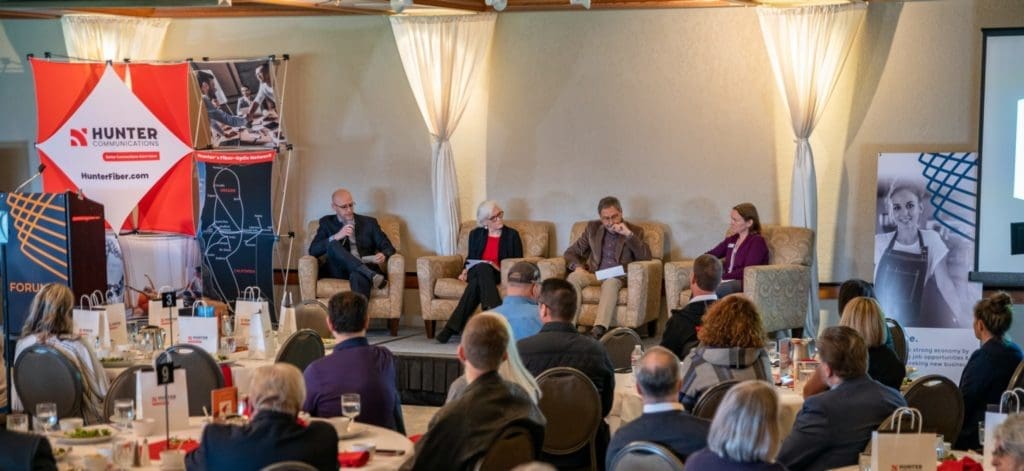Quality Internet Access, Affordability, and Equity in Oregon
Apr 7, 2022 | General, News Articles
Hunter Communications sponsored and hosted the Chamber of Medford and Jackson County’s March Forum, A Discussion on Quality Internet Access, Affordability, and Equity in Oregon. Carey Cahill, Vice President of Sales and Marketing, moderated the panel, which included three esteemed guests to discuss the state of internet access in Southern Oregon. With the recent passage of the Infrastructure Bill and the digital divide exacerbated by the pandemic, no topic was more pertinent than expanding broadband access and striving toward digital equity.
Internet Access & Equity in Oregon
Internet is a basic utility and is key to participating in our communities, in our schools, and in our workforce. In Oregon, 40% of rural and 20% of urban areas don’t have access to internet speeds faster than 10 Mbps / 1 Mbps. With historic investments in broadband from both the public and private sectors, internet service providers will be able to deliver more access to unserved and underserved communities throughout the state. But, just because people have access to computers and the internet does not mean they know how to use them. Representative Marsh explained, “We realize that it’s not just enough to build [infrastructure] out. You’ve got to make sure that people can actually use the technology and that it’s meaningful in their work and personal lives.” Creating opportunities for citizens to learn how to use the internet and connected devices is the first step toward digital fluency and equity. Community organizations in Southern Oregon, like the libraries and A Greater Applegate, have invested time in developing digital equity programs to help residents learn how to leverage internet technologies in their daily lives.
Broadband Investment & Public-Private Partnerships
The federal government’s Infrastructure Investment and Jobs Act allocated $65 billion to improving broadband throughout the nation. The act focuses funding on three main goals: access, affordability, and digital equity. There is also $1 billion in funding dedicated to middle-mile development. This money will help bring broadband closer to rural communities and make last-mile connectivity more accessible to rural and remote residents. The bill will distribute at least $100 million to each state to expand internet access in unserved and underserved communities. Funding will focus on bringing broadband to areas that lack adequate speeds, choice, and affordability. In Oregon, the legislature is preparing to receive and distribute federal funds throughout the state. With a broadband omnibus bill, the legislature can implement oversight of the broadband office, create a strategic framework for planning and implementation, and develop a mapping protocol. Public-private partnerships will be one of the most important factors in implementing the funding from the Infrastructure Bill successfully.
“Where the pubic money is going to step in here, is to serve those communities where it just doesn’t make sense for the private sector to do that alone. We will certainly continue to see partnerships with the private sector in this work though. They are going to be integral to our ability to take advantage of the money,” said Representative Marsh.
The state has an interest in partnering with local entities who are invested in Oregon’s future and who want to create local jobs, spur economic growth, and improve education and healthcare. To watch more videos from the event, please click here. Hunter Communications is proud to provide our local communities with the best fiber-optic internet connection. The company serves schools and local governments in rural and urban areas and residential neighborhoods throughout the state of Oregon. To see if Hunter Fiber is available at your home, please click the button below.

